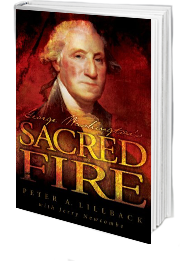A Haven for Conscience
Jerry Newcomb:
Throughout history, many governments have not respected the right of conscience, yet god alone is to be the Lord of one’s conscience, says the Westminster Confession of Faith written in the 1640s. One of the very first outpost anywhere to honor the right of conscience was the Puritan colony in the new world of Rhode Island. Reverend Roger Williams wanted to create a haven where people could lead as their conscience directed them, not the state.
Speaker 2:
One of the earliest Puritans to have a fallout with Winthrop and other fellow Puritans was Reverend Roger Williams, who lived from 1603 to 1683. He was a stickler for conscience. He was non-compromising and not easy to get along with. Historian Paul Johnson, who called Winthrop the first great American, called Roger Williams the second great American.
Speaker 2:
If puritanism means being strict because of religion, then Roger Williams out-Puritaned the Puritans. Roger Williams spent a short time as a teacher and minister in Salem, in Plymouth, back to Salem, and then in Boston. When the Puritan leaders began a policy of requiring oaths, that he is forcing them to make vows of allegiance to the colony to ensure its survival, since there was trouble within and trouble without, Williams felt that taking oaths like this violated the Bible.
Speaker 2:
Jesus said, “Don’t swear or take oaths, but let your yes be yes, and your no, no.” Reverend Williams could not, in good conscience, swear allegiance to the colony or to any colony. Williams’ prickly dissent was not welcome. This refusal to take the Freeman’s oath was the last straw. They ordered him to return to England. For the first time, Roger Williams disobeyed them, but it was wintertime.
Speaker 2:
Reverend Williams fled into the wilderness, but he was helped by Indians along the way during the 14 week flight. He was so grateful to God that he named the city he founded in honor of God. The name has stuck to this day, Providence, the capital of the colony he founded, Rhode Island, which he determined to make a place of refuge for conscience sake.
Speaker 3:
Roger Williams, I think was a man ahead of his time in many ways. Many of us think that somehow or other, religious liberty is something that has roots way, way deep in history. Actually, religious Liberty is a very unusual thing in human history.
Speaker 3:
It actually took several centuries for us to go from state-sponsored religion, to a little bit of religious toleration, to more toleration, to full religious Liberty. Roger Williams was someone who believed that it was important that a man’s conscience before God comes before his responsibility to obey civil authorities.
Speaker 2:
A few years later, Reverend Roger Williams returned to England to apply for permission to create the colony of Rhode Island, which he viewed an experiment in religious Liberty. There would be no religious test for anyone to be a resident there.
Speaker 4:
I desired. It might be for a shelter for persons distressed for conscience. Roger Williams.
Speaker 2:
Rhode Island became a place where God alone was respected as the ruler of conscience. Historian Paul Johnson notes that Rhode Island introduced the principles of complete religious freedom, the separation of church and state, and the practice of religious competition. His great contribution was freedom of conscience and a clarion call against using the force of the state to enforce correct doctrine.
Speaker 5:
Forcing people against their will isn’t what love was about. It’s not what true faith is. Jesus never, never used violence to tell people they had to be his follower. He let them go freely.
Speaker 2:
Roger Williams decried the blood of so many that had been shed in the name of religion. In 1644, he wrote a treatise against this, the Bloody Tenant of Persecution, in which he declared that the only type of sword to be used by the Christian was the sword of the spirit, another phrase for the word of God, the Bible.
Speaker 4:
God needed not the help of material sword of steel to assist the sword of the spirit. Roger Williams.
Speaker 2:
Thus, Rhode Island became a haven for conscience sake, including Anne Hutchinson, a self-proclaimed prophetist, who fled persecution in Boston. Rhode Island became the home of America’s oldest, still standing Jewish synagogue. George Washington wrote a now famous letter to that synagogue that was established in Newport, Rhode Island.
Speaker 6:
May the children of the stock of Abraham who dwell in this line continue to merit and enjoy the good will of the other inhabitants, while everyone shall sit in safety under his own vine and victory. There shall be none to make him afraid. George Washington.
Jerry Newcomb:
We take freedom of conscience for granted in America, because we’ve had it for so long. As we have seen, to the Puritan leader, Reverend Roger Williams, conscience was so important that he fled into the wilderness for it, where he was providentially spared an early death. The city he founded, Providence, is even named after God. That’s another reminder of our nation’s rich Christian heritage. Conscience rights must be protected, less we end up with the tyranny of the majority. For Providence forum, I’m Jerry Newcomb.
